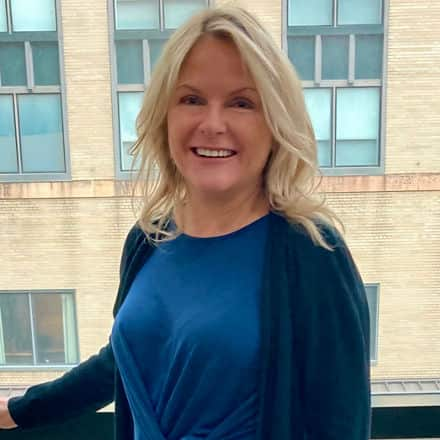Celebrating 10 Years of Nursing Programs at SNHU
Since establishing the inaugural BSN program in 2012, Southern New Hampshire University (SNHU) has become part of a powerful community of nurse leaders — from students and alumni to instructors and deans. Today, in honor of Nurses Month, the university reflects on 10 years of nursing education at SNHU.
Nurses Make a Difference
The 2022 American Nurses Association (ANA) Nurses Month theme is “Nurses Make a Difference” — and in the face of the pandemic, many nurses are turning to education to do just that. In April 2021, the American Association of Colleges of Nursing reported a 5.6% enrollment increase for BSN programs.
SNHU now provides a space for nurses across the country to gain skills that can help shape the future of healthcare. But before expanding its online Bachelor of Science in Nursing (BSN) and Master of Science in Nursing (MSN) programs, the university joined the nursing community on a much smaller scale.
Launching the First BSN

“It was exciting to be involved in the first round of nursing course development in 2012,” Allen said. “There were some initial challenges for nurses to understand the systems and processes at SNHU. Yet, we were able to collaborate and produce solid nursing programs that went on to receive Commission on Collegiate Nursing Education (CCNE) accreditation.”
The program also created a seamless pathway for students from New Hampshire community college partners, as it allowed them to apply their credits toward a bachelor’s level degree.
This was the case for Josef Hodgkins ’14, one of the first graduates of the inaugural BSN cohort. “The nursing program at SNHU taught me to focus my clinical thought,” Hodgkins said. “After my associate degree, I was in a state of clinical disequilibrium. SNHU took that raw intelligence and refined it.”
Removing Barriers Through Student Support
The BSN program helped expand access to education for Hodgkins, as well as a whole new population of healthcare workers. No longer held back by limitations of time, location and cost, college suddenly seemed possible.
“Many barriers for students to get into the program were gone,” Allen said. Not only could students access a seamless transfer process and flexible online course schedules; they also got “extra support from advising to stay on track to complete their nursing education,” she said.

For this inaugural class, graduating meant realizing a goal that once seemed out of reach. Yet, as important as it was for them, they weren’t the only ones impacted by this defining moment.
“Witnessing that first nursing cohort of graduating students was amazing,” Allen said. “We were able to have a pinning ceremony before the graduation ceremonies (with students, family, faculty and university leadership). I was very proud of the students and their accomplishments. It was an affirming moment for me as to where I wanted to invest my teaching career.”
Celebrating Nurses Today
A lot has changed since that first ceremony.
Today, Hodgkins works as an acute care case manager, where he uses the skills from his degree every day to help improve patient experiences. “The role is a mix of clinical thinking, attending meetings, working with families and patients, as well as insurers and ancillary care centers,” he said.
In addition to his new role, Hodgkins finds himself in good company with an alumni network that just keeps growing. In spring 2022, SNHU celebrated over 400 online nursing graduates and 1,100 more who earned healthcare degrees. While the university still offers pathways for community college grads to continue their education, SNHU nursing degrees have since expanded to meet the needs of an increasingly advanced healthcare system.

The FNP track was just one of five MSN program tracks designed to help prepare SNHU nursing graduates for success in their field. In 2021, SNHU also launched the MSN in Healthcare Quality & Safety, MSN in Nurse Executive Leadership, MSN in Nursing Education and MSN in Population Healthcare.
These specialized programs signal the more complex roles of nursing today. But beyond that, Rosenberg notes, they indicate how central nurses are to the bigger picture of healthcare.
“The pandemic resulted in an environment where changes occurred rapidly and finding sources of accurate health information could be challenging for many individuals,” said Rosenberg. “Throughout the pandemic, nurses remain calm, advocating for patient needs, providing needed care, and educating the public about the realities and challenges they were experiencing.”
It's this quality that proves now, more than ever, the importance of stepping up to support nursing communities. “Their personal dedication to others and perseverance through tremendous challenges should be celebrated and recognized,” she said.
A degree can change your life. Find the SNHU nursing program that can best help you meet your goals.
Spencer Hensel is a copywriter in higher education. Connect with him on LinkedIn.
Explore more content like this article

The Importance of Health Education

SNHU Spotlight: Philip Hensarling, BS in Healthcare Administration Grad

SNHU Spotlight: AnnMarie Kulis, MS in Healthcare Administration Grad
About Southern New Hampshire University

SNHU is a nonprofit, accredited university with a mission to make high-quality education more accessible and affordable for everyone.
Founded in 1932, and online since 1995, we’ve helped countless students reach their goals with flexible, career-focused programs. Our 300-acre campus in Manchester, NH is home to over 3,000 students, and we serve over 135,000 students online. Visit our about SNHU page to learn more about our mission, accreditations, leadership team, national recognitions and awards.


